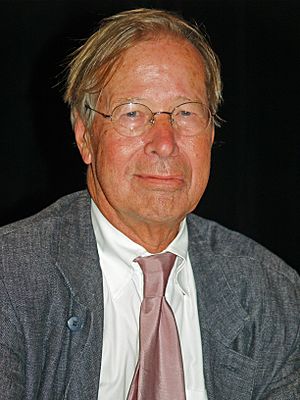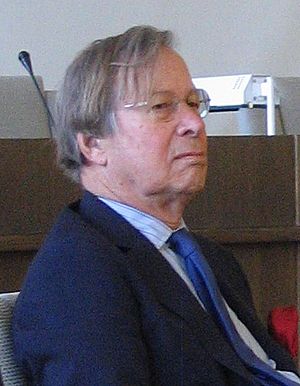Ronald Dworkin facts for kids
Quick facts for kids
Ronald Dworkin
|
|
|---|---|

Dworkin at the Brooklyn Book Festival in 2008
|
|
| Born |
Ronald Myles Dworkin
December 11, 1931 Providence, Rhode Island, US
|
| Died | February 14, 2013 (aged 81) London, England
|
| Alma mater | |
| Era | Contemporary philosophy |
| Region | Western philosophy |
| School | Analytic Legal interpretivism |
| Institutions | |
| Doctoral students | Jeremy Waldron |
|
Main interests
|
|
|
Notable ideas
|
|
|
Influences
|
|
|
Influenced
|
|
Ronald Myles Dworkin (December 11, 1931 – February 14, 2013) was an important American philosopher and legal expert. He studied United States constitutional law. At the time of his death, he was a professor at New York University and University College London.
Dworkin also taught at Yale Law School and the University of Oxford. He took over from another famous philosopher, H.L.A. Hart, at Oxford. Dworkin greatly influenced both the philosophy of law and political philosophy. He won the 2007 Holberg International Memorial Prize for his "pioneering scholarly work" that had a "worldwide impact."
Many people consider Dworkin one of the most important legal thinkers of the last 100 years. His idea of "law as integrity" is very famous. This idea says that judges should interpret laws based on fair and consistent moral rules. He also believed in a "moral reading" of the United States Constitution. Dworkin often wrote about current political and legal topics.
Contents
Early Life and Education
Ronald Dworkin was born in 1931 in Providence, Rhode Island, in the United States. His family was Jewish. He went to Harvard University and graduated in 1953 with top honors. He studied philosophy there.
After Harvard, he went to Magdalen College, Oxford, in England. He was a special student called a Rhodes Scholar. His teachers were very impressed with his work. He earned a high-level degree from Oxford.
Dworkin then went to Harvard Law School, finishing in 1957. He worked for a judge named Learned Hand. Judge Hand thought Dworkin was an amazing law clerk. Dworkin also said Judge Hand was a very important mentor to him.
Career Highlights
After working for Judge Learned Hand, Dworkin decided not to work for another judge. Instead, he joined a law firm in New York City called Sullivan & Cromwell.
Later, Dworkin became a Professor of Law at Yale Law School. In 1969, he moved to University of Oxford to become the Professor of Jurisprudence. He took over this role from his former teacher, H.L.A. Hart.
After leaving Oxford, Dworkin taught at University College London. He also became a professor at New York University (NYU) in the late 1970s. For many years, he wrote articles for The New York Review of Books. He gave many important lectures at famous universities like Harvard University, Yale University, and Princeton University.
Understanding Law and Philosophy
Law as Principles
Ronald Dworkin had different ideas from another philosopher, Hart, about how law works. Dworkin believed that law is not just a set of rules. He thought that law also includes moral principles.
Dworkin's main idea is called "law as integrity." This means that judges should interpret laws in a way that makes the law a complete and fair story. They should look at past laws and decisions. Then, they should try to find the best meaning that fits with fairness and justice.
He argued that even when legal rights are unclear, there is usually a "right answer." This answer comes from carefully interpreting the law. Dworkin did not think judges just made up new rules when cases were difficult. He believed they had to discover the best existing answer.
Dworkin thought that law and morality are connected. He said that deciding what the law is often involves making moral judgments.
The Idea of a "Right Answer"
Dworkin had a famous idea that there is a "right answer" to every legal question. This does not mean everyone will agree on it. It means that if someone thinks about the law correctly, they will find the best answer.
To explain this, Dworkin used the idea of "Judge Hercules." Hercules is a mythical hero. Dworkin's Judge Hercules is an ideal judge. This judge is very wise and knows all the laws. Judge Hercules would take a lot of time to decide a case. He would try to make the law a complete and fair system.
Dworkin knew that real lawyers often disagree. But he said they are disagreeing about what the one right answer is. They are trying to find the answer that Judge Hercules would give.
Moral Reading of the Constitution
Ronald Dworkin strongly believed in the "moral reading" of the United States Constitution. This means that the Constitution should be understood based on its moral principles. He thought this idea helped explain why judges can review laws. It helps make sure laws follow the basic ideas of fairness and rights.
Equality for Everyone
Dworkin also had important ideas about equality. He believed that everyone deserves equal concern and respect. He thought people are responsible for their life choices. But he also believed that things like intelligence or talent are just luck. These things should not decide how resources are shared in society. His idea is called "equality of resources."
Freedom and Rights
Dworkin believed that true freedom means being able to do what is right. He argued that freedom and equality do not have to conflict. For example, he said that if someone is stopped from committing a crime, their freedom is not truly taken away. This is because they were trying to do something wrong. So, freedom means being able to do what we want, as long as we respect the rights of others.
Personal Life and Passing
While working for Judge Learned Hand, Dworkin met Betsy Ross. They got married in 1958 and had two children, Anthony and Jennifer. Betsy passed away from cancer in 2000. Later, Dworkin married Irene Brendel.
Ronald Dworkin died in London on February 14, 2013. He was 81 years old and passed away from leukemia. He was survived by his second wife, his two children, and two grandchildren.
Awards and Honors
Ronald Dworkin received many awards for his work.
- In 2007, he won the Holberg International Memorial Prize. This award recognized his "liberal egalitarian theory." It praised his ability to connect big philosophical ideas with everyday legal and political issues.
- In 2006, the New York University Annual Survey of American Law honored him.
- He also received the International Prize of legal Research "Dr. Héctor Fix-Zamudio" in Mexico.
- Dworkin received several honorary doctorates from universities. These included the University of Pennsylvania (2000), Harvard University (2009), and the University of Buenos Aires (2011). The University of Buenos Aires noted that he "tirelessly defended the rule of law, democracy and human rights."
- In 2012, he received the Balzan Prize for Jurisprudence. This prize recognized his important contributions to law. It noted his original thinking and how he connected law with ethics and politics.
- He was also an honorary Queen's Counsel (QC) in the UK.
- Dworkin was elected a fellow of important groups like the British Academy.
Published Works
Books by Ronald Dworkin
- Taking Rights Seriously. 1977.
- A Matter of Principle. 1985.
- Law's Empire. 1986.
- A Bill of Rights for Britain. 1990.
- Freedom's Law: The Moral Reading of the American Constitution. 1996.
- Sovereign Virtue: The Theory and Practice of Equality. 2000.
- Justice in Robes. 2006.
- Is Democracy Possible Here? Principles for a New Political Debate. 2006.
- The Supreme Court Phalanx: The Court's New Right-Wing Bloc. 2008.
- Justice for Hedgehogs. 2011.
- Religion Without God. 2013.
Books Edited by Ronald Dworkin
- The Philosophy of Law. 1977.
- A Badly Flawed Election: Debating Bush v. Gore, the Supreme Court, and American Democracy. 2002.
- From Liberal Values to Democratic Transition: Essays in Honor of Janos Kis. 2004.
Images for kids
See also
 In Spanish: Ronald Dworkin para niños
In Spanish: Ronald Dworkin para niños
- Contributions to liberal theory
- Hart–Dworkin debate
- Judicial activism
- Legal formalism
- List of American philosophers



